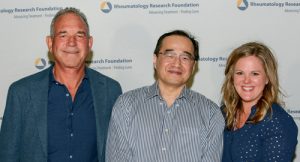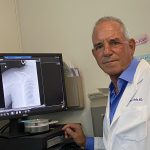GOLDEN BEACH, FLORIDA—On March 23, the Rheumatology Research Foundation hosted an event to announce the first recipient of the Norman B. Gaylis, MD, Research Award for Rheumatologists in Community Practice (Gaylis Award): Sou-Pan Wu, MD. Held at Dr. Gaylis’ home, about 60 people, including representatives of the Foundation and the ACR, attended the event. The venue was selected to personalize the ceremony, bring it closer to where Dr. Gaylis has lived and practiced for nearly 40 years.
The First Recipient
The Gaylis Award is designed to encourage research from physicians in community practice who are engaged in patient care. The award recipient must be a practicing clinician who has an innovative idea for an investigation with the potential to improve rheumatology practice and quality of life for rheumatology patients. Dr. Wu checks all the boxes.
A practicing rheumatologist at Health Partners in St. Paul, Minn., Dr. Wu completed his professional education at Indiana University, Bloomington. He did his a residency in internal medicine at the University of Wisconsin Hospitals–Madison and a fellowship in rheumatology at Yale University, New Haven, Conn. Dr. Wu is board certified by the American Board of Internal Medicine and the American Board of Internal Medicine—Rheumatology.
Dr. Wu’s professional philosophy involves establishing trust between the patient and physician. In his profile on the Health Partners website, he says, “Many diseases in rheumatology are often chronic and difficult to treat. The prognosis and outcome often depend on the trust and cooperation between the patient and the physician. I strive to provide the best care I can by being patient, paying attention to details, practicing evidence-based medicine and staying up to date as much as possible.”
The Hmong Gout Project
With support from the Foundation’s Gaylis Award, Dr. Wu will investigate gout in the Hmong community of Minnesota’s Twin Cities. The Hmong people, who come from Southeast Asia, suffer from a higher rate of gout than the general population and are at a greater risk of comorbidities, including renal failure, joint destruction, early cardiovascular disease and disability. This risk may be a result of cultural barriers and a distrust of Western medicine.
Genetic factors may play an important role in the development of hyperuricemia and intense inflammatory response in the Hmong community. Dr. Wu’s project seeks to identify these genetic factors, develop a genetically based statistical risk model for the Hmong and create a registry for this vulnerable population. An increased understanding of why gout is so common among the Hmong may help physicians provide early detection and timely treatment, as well as prevent associated morbidities. The registry data will add to the current body of knowledge and may help rheumatologists better understand the roles different genetic and environmental factors play in gout development not only among the Hmong, but more generally as well.




